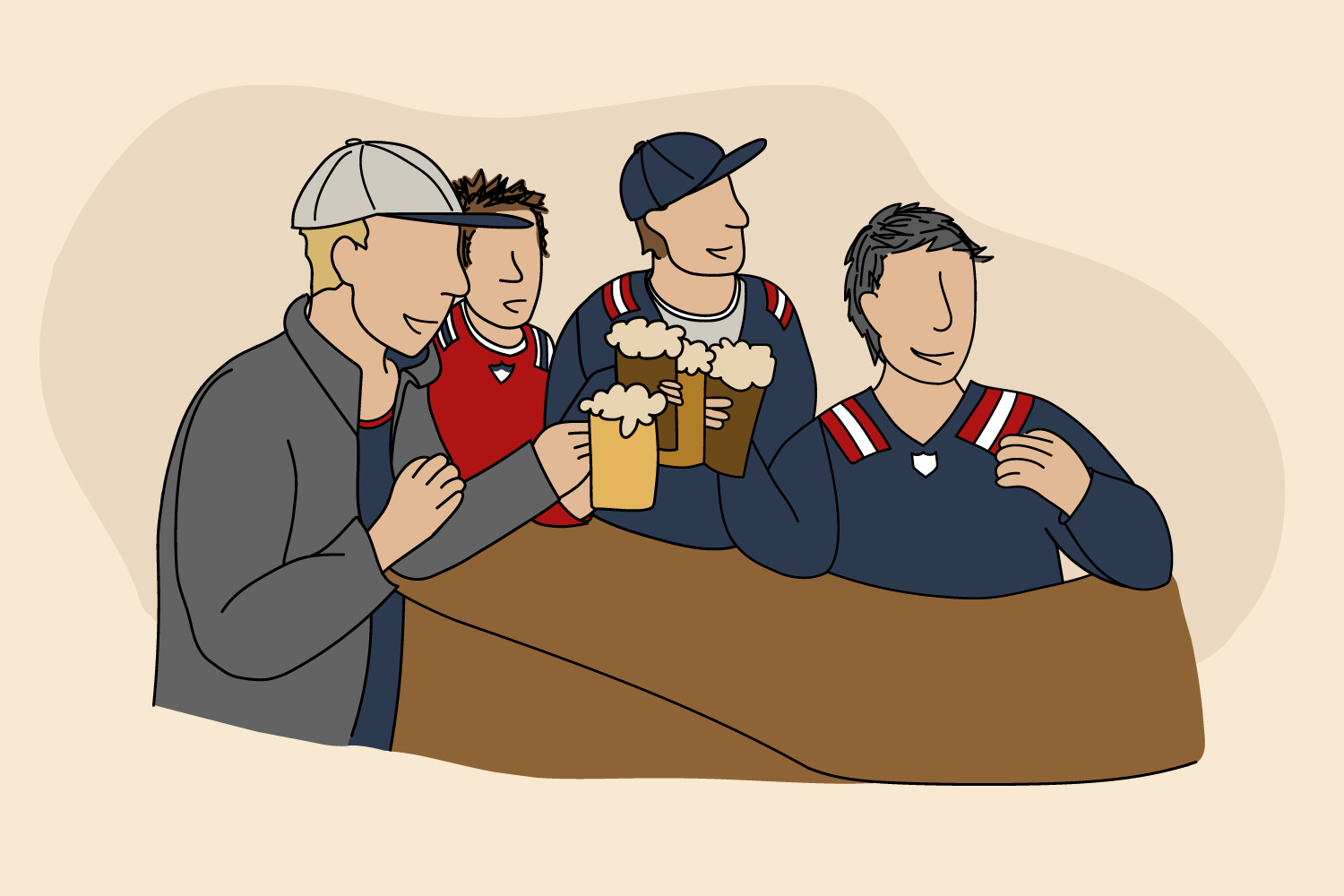During the month of April, we’re publishing a series of interviews, essays, advice columns and reported features about the male friendship crisis in the U.S., a particularly troubling slice of the country’s larger loneliness epidemic. There’s no one-size-fits-all solution, so we’re breaking it down from all angles in The Male Friendship Equation.
Chez Chesak moved to Cincinnati 15 years ago for his wife. She was from the area, and as a travel writer, he worked from home or on the road. But beyond his partner, he had no connections to the city.
“I tried making friends in various ways — a dads’ group at our girls’ school or playing on flag football teams,” Chesak says. “But I could never connect with anyone. I spent years trying.”
His solution? In a way, he went back home. Chesak is from the New England area and, unsurprisingly, a sports fan. So he started a fan club for the Patriots, which would meet at a bar owned by a guy originally from Massachusetts called Local Post, located in Cincinnati’s Columbia-Tusculum neighborhood.
“Now almost all of my friendships here are because of that bar,” Chesak says, years later. Outside of the shared Patriots devotion — the group has now expanded to include other Boston-area sports — the friend group is an eclectic mix of ages and professions, including college students, an executive from Proctor & Gamble, an electrician, a doctor, some blue-collar workers and a few retirees.
Still, even this tight-knit and somewhat unorthodox friendship group can have its ups and downs. “The group ebbs and flows as our teams do well…or not,” Chesak admits. “When our teams were good, we’d just about fill the entire bar.” That said, there is a core group of friends within the group that meet at Local Post all the time. “And those are real friends — we talk about more than sports. Work, travel, everything else — except politics.”
The friendships have, thankfully, also outgrown the bar. Some of the core group go to Chesak’s place for drinks, for parties, to hang around a fire pit. A few attended his wife’s fundraiser for her nonprofit. And once a year, the group travels to a team’s away game.
The Male Friendship Equation: Stories, Interviews and Advice During an “Epidemic of Loneliness”
American men are in the midst of a friendship crisis, so we’re turning our attention to these all-important platonic relationshipsNow, anyone who’s watched Cheers or any TV sitcom knows that the featured bar has to be its own character. The Local Post fits that mold: It’s housed in a building that used to be a post office and the bar staff will mail a patron’s postcard from the bar. The space is open and conducive to crowds, and the owner and staff are friendly with Chesak’s group. “We actually found the place thanks to a server a few of us knew,” he says.
Is basing a friendship group around a bar healthy? After asking multiple experts, many gave the same “yes and no” answer. “Bars are fertile ground for establishing friendships and providing a relaxed atmosphere,” says Dr. Ketan Parmar, a psychiatrist and mental health expert at ClinicSpots. “Friend groups in bars often form around shared interests, such as watching sports, enjoying music or participating in trivia nights. The regularity of such activities can facilitate sustained interaction and foster deeper connections.”
That said, there are some obvious drawbacks. “Regularly centering social interactions in environments focused on alcohol consumption can pose risks to both physical and mental health,” Dr. Parmar adds. “Not all individuals feel comfortable or can engage in social settings that center around alcohol consumption. I’d encourage people in these situations to diversify their social activities outside of the bar to enhance the quality of friendships and contribute to overall well-being.”
Chesak somewhat agrees. “I wish that, for my health’s sake, I’d met more friends through a hiking club or playing flag football or something,” he says. “As it is right now, we’re pretty sedentary — watching a game as we sit and mack on wings and pound drinks. But we do have a great time.”
And it’s not like Chesak had a choice. He admits that his initial efforts at making friends fell on deaf ears. “Nothing stuck until I started meeting everyone at the bar,” he says. “All the people here have similar passions and attitudes that align with mine. But I do think that men in general are cautious about opening up and thus slow to really embrace someone new, so it takes time and repeated exposure before we can start to open up to one another without feeling overly vulnerable.”
Maybe it’s no surprise that alcohol and sports are the easiest way for friendships to form, particularly with men (though Chesak’s group does include a few women). After all, a well-loved TV sitcom was built entirely around that premise.
“What we have is very Cheers-like,” he admits. “When one of us walks in to watch a game, everyone yells out and calls your name. It’s very cool and now very much a second home. There’s even a picture of Norm and Cliff hung, discretely, in the far corner of the bar.”
Whether you’re looking to get into shape, or just get out of a funk, The Charge has got you covered. Sign up for our new wellness newsletter today.
